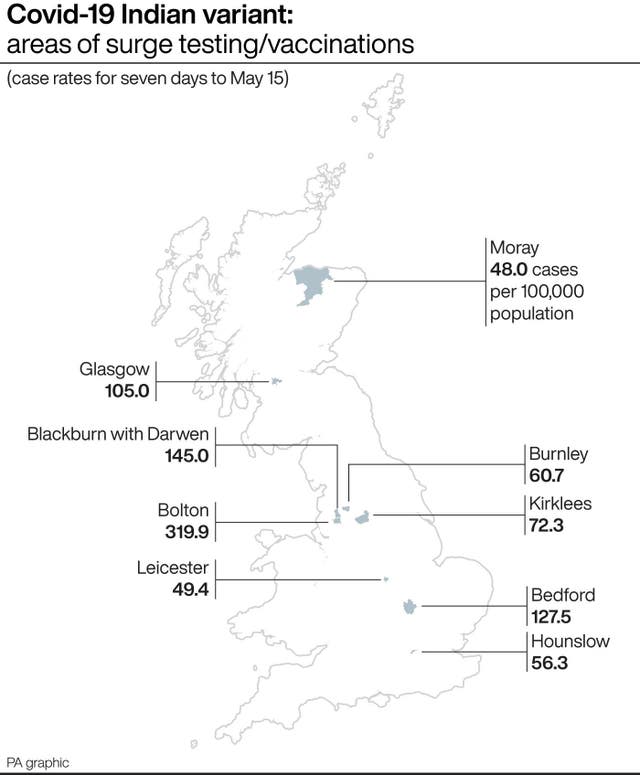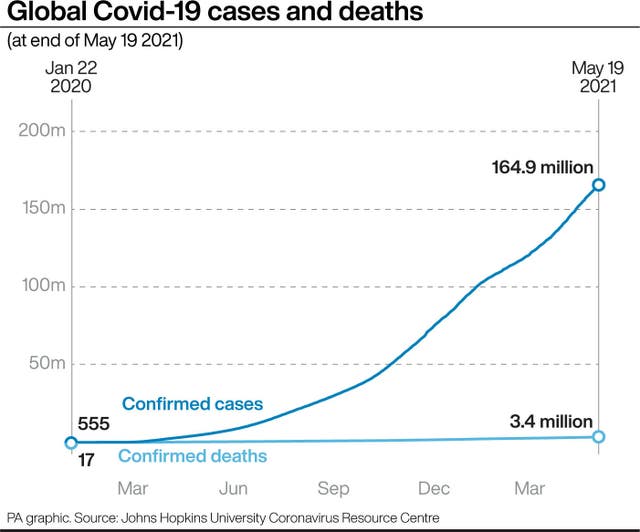The UK could be at the start of a third wave of coronavirus, a professor from the Scientific Advisory Group for Emergencies (Sage) has said.
Professor Andrew Hayward, an infectious diseases expert at University College London, said he was “very concerned” about the Indian variant due to its ability to spread quickly.
He also said the UK should not “waste the opportunity” offered by vaccination by allowing people to travel widely.
Asked on BBC Breakfast if the country was at the start of the third wave, he said: “I think so.
“I think what we can see is that this strain can circulate very effectively, although it was originally imported through travel to India, it’s spread fairly effectively first of all within households and now more broadly within communities, so I don’t really see why it wouldn’t continue to spread in other parts of the country.
“Obviously we’re doing everything we can to contain the spread of that, but it’s likely that more generalised measures may start to be needed to control it.”
Speaking in a personal capacity about the Indian variant, Prof Hayward said he was “very concerned”.
He added: “I think that concern largely arises from the fact that it’s more transmissible than the previous variants which was already substantially more transmissible than the variant before that.

“So whilst I think we’ve always thought that we would have another wave of Covid, the size of that wave is going to very much depend on how transmissible the variant that causes it is and what proportion of the population have been vaccinated when it hits.
“Fortunately we’ve had a good proportion of the population vaccinated, but there’s still people who aren’t vaccinated in high-risk groups, the vaccine isn’t 100%, effective, and also even in the younger groups if you get many, many thousands or hundreds of thousands of cases, then you will expect a lot of hospitalisations and deaths to result from that.
“So that’s the threat. And it’s really over the next week or two we will see how much these outbreaks that at the moment are relatively localised, how much they become generalised across the population. And if that happens, that’s when we’re going to be much more worried.”
Prof Hayward suggested he was in favour of restricting travel to stop variants being imported.
“Well that does concern me as well,” he said. “And this is one of the reasons why it’s important to really minimise travel full-stop, whether it’s to red list or amber list countries, because there is mixing involved in travelling both on aeroplanes, in airports, and of course in the country where you go to.
“I think at the moment, over the next period of time whilst we’re really trying to get as much of the population vaccinated as possible, so we’ve got that whole population protection type approach, then we don’t really want to waste the opportunity of that through too much travel.”

He said he thought the approach adopted by Australia and New Zealand “would be the most successful model at keeping Covid out from other countries” but it was for Government to decide when balanced against other factors.
“And there’s also arguments on the other side that if you’ve got similar levels of Covid in another country, that people are vaccinated, then what’s the fuss?,” he said.
“So it’s not a black-and-white issue.”
Prof Hayward said he backed the policy of vaccinating older people with two doses before moving onto younger age groups.
He added that it was his “hunch” that the Indian strain would become dominant in the UK and possibly across the world.
“That really brings it back down to this race against the vaccine and the virus, except the virus just got faster,” he said.




Comments: Our rules
We want our comments to be a lively and valuable part of our community - a place where readers can debate and engage with the most important local issues. The ability to comment on our stories is a privilege, not a right, however, and that privilege may be withdrawn if it is abused or misused.
Please report any comments that break our rules.
Read the rules hereLast Updated:
Report this comment Cancel